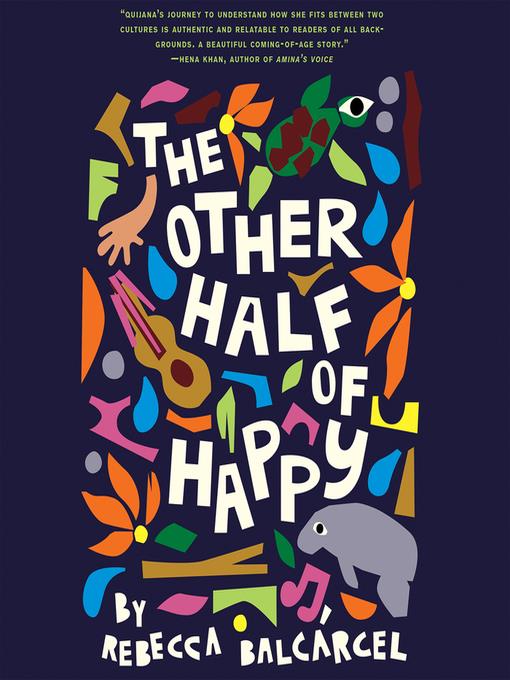
The Other Half of Happy
فرمت کتاب
audiobook
تاریخ انتشار
2019
Lexile Score
570
Reading Level
2-3
ATOS
3.8
Interest Level
4-8(MG)
نویسنده
Ariana Corderoناشر
Chronicle Booksشابک
9781797201979
کتاب های مرتبط
- اطلاعات
- نقد و بررسی
- دیدگاه کاربران
نقد و بررسی

July 1, 2019
A seventh grader plots to run away to Grandma's instead of going on a family trip abroad. Half-Guatemalan, half-white Quijana, named for Don Quixote, is much happier identifying as Anglo than Latinx. She doesn't speak Spanish, a fact that doesn't bother her too much until her Guatemalan cousins move to town, and not fitting in with the other Latinx kids at her new junior high doesn't help matters. When her parents announce that the family, which includes her 3-year-old brother Memito, is going to Guatemala over winter break, Quijana knows she can't go and embarrass herself. She resolves to save money and buy a bus ticket to Florida, where her maternal grandmother is going through cancer treatments. Key to her plan is selling the Guatemalan huipil her abuela sent her in order to pay for the trip. Biracial Quijana's anxieties about her mixed identity, not fitting in, and wanting to find her own way will ring authentic for readers of mixed backgrounds, but her voice skews younger than 12, and preteens may be unconvinced of the sincerity of Quijana's friendships with her peers compared with her hyperattachment to Grandma, who seems like her real best friend. Spanish phrases are (thankfully) not italicized but are usually translated within a few sentences; appendices include Grandma's "wise words," quotations from Don Quixote, titles of poems referenced in the text, directions to a game played, and science notes. A novel about liminality with little in the way of originality. (Fiction. 8-12)
COPYRIGHT(2019) Kirkus Reviews, ALL RIGHTS RESERVED.

Ariana Cordero's narration is bright and expressive in this audiobook about a girl who is trying to discover how all her pieces fit together. Quijana is 12, half Guatemalan, and starting over at a new school. It's a lot to handle, even without her Grandmother Miller's illness and her brother Memito's concerning behavior. Cordero gives Quijana a voice that can flip between excitement and distress in an instant as she struggles with how she fits in among her new classmates and extended family. The performance verges on frantic at times but never lacks the passion of a preteen. The calm, gentle tones of Quijana's father and grandmother, separated by culture but alike in temperament, provide contrast that rounds out this enjoyable production. N.M. � AudioFile 2019, Portland, Maine

Starred review from September 15, 2019
Grades 5-8 *Starred Review* As Quijana begins seventh grade, she finds that her school and classmates aren't the only things that have changed. Her father, who came to the U.S. from Guatemala, is putting more pressure on her to adopt his culture by speaking Spanish and playing guitar so that they can sing boleros?something made difficult by Quijana's lack of fluency in Spanish. Meanwhile, her younger brother, Memito, is behaving differently and having difficulty with words, leaving her desperate to find a way to help him. And then her grandma, who has taught her so much about nature and adventure, suddenly grows ill. As the world changes around her, Quijana learns that nothing can stop time, and with the help of her caring friends, loving family, the wisdom of nature, and?of course?Don Quixote, she must find the strength to overcome her fears and discover her true self. With poetic, flowing prose that sometimes feels more like a song and characters so convincing that they seem real, Balc�rcel's stunning debut depicts the struggles of being raised with two cultures and the challenges of not being authentic enough?in this case, not Guatemalan enough or not American enough. A lovely, moving, and realistic view of the struggles and insecurities?as well as the beauty?that comes from being bicultural.(Reprinted with permission of Booklist, copyright 2019, American Library Association.)

























دیدگاه کاربران